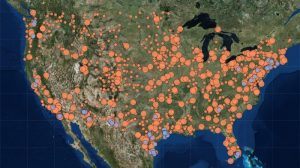Lindsay McKenzie in Inside Higher Ed:
 As stories of immigrant children separated from their parents after crossing the U.S.-Mexico border dominated headlines last month, one question came up repeatedly: Where are the children being held?
As stories of immigrant children separated from their parents after crossing the U.S.-Mexico border dominated headlines last month, one question came up repeatedly: Where are the children being held?
Immigrant rights advocates, civil liberties groups, federal lawmakers and state governors all demanded answers and tried to get the information in their own individual ways. But a team of scholars set out to find out definitively by mapping the locations of federal and private juvenile detention facilities across the country over a six-day period.
Their data mapping project, Torn Apart/Separados, quickly captured the imagination of academics and gained national media attention. Efforts to expand the project and have it peer reviewed are ongoing, and the organizers are seeking volunteers to help.
Roopika Risam, a member of the mapping team and an assistant professor of English at Salem State University, said she anticipated a strong reaction to the project because of the “timely, political and heartbreaking” subject matter. But what Risam did not expect was the strong reaction the project received from other digital humanities scholars and the sense of vindication and validation of the value of their work.
More here.
